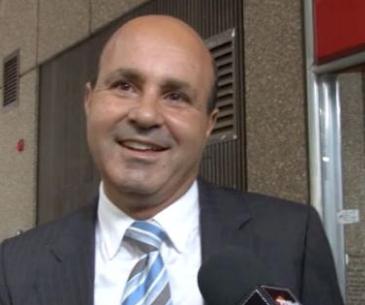IIA to ask members to sign ACTA petition

Internet Industry Association (IIA) chief executive officer Peter Coroneos has said he plans to ask his members to sign a declaration calling for more transparency in the Anti-Counterfeiting Trade Agreement (ACTA) talks being held this week in Wellington, New Zealand.
The agreement aims to establish international standards on how to enforce intellectual property rights given the changes the internet has brought to copyright. There have been a number of rounds nutting out details for the agreement, involving delegations from multiple countries such as Australia, Canada, the European Union, Japan, Korea, Mexico, Singapore, Switzerland, Morocco and the US.
The Department of Foreign Affairs and Trade (DFAT), the Attorney-General's Department, Australian Customs Service, Australian Federal Police and IP Australia have all been involved in the negotiations, according to DFAT's website.

IIA CEO Peter Coroneos
(Credit: ZDNet.com.au)
There has been an enormous amount of controversy around the talks due to the little information provided on exactly what is being discussed. Leaks have occurred, releasing what appear to be documents on the agreement, fanning concerns that unworkable deals might be struck without the public having input.
With secret talks being held, the IIA (among others) will be seeking to get its members to sign a declaration calling for more transparency.
Coroneos had flown to New Zealand to help draft such an agreement, called the "Wellington Declaration", which was created over the weekend at a conference in New Zealand called PublicACTA, supported by New Zealand internet action group InternetNZ.
"I assisted in the drafting of this — we now need to get formal endorsement from the IIA board to sign off on that — and we expect to get that by this afternoon," Coroneos said yesterday. "Once that occurs we will be notifying all members of the IIA to lend their weight to the declaration," he said.
The declaration called on governments to actively engage with the public on the ACTA process. It also said, amongst other concerns, that the agreement should not be signed without impact assessments on how the terms will affect the countries' economic, social and cultural environment, and that there needed to be flexibility in the agreement to adjust to the differences between nations. Privacy issues and the role of internet service providers as the gateway to the internet were also addressed, with disconnection from the internet considered unacceptable if customers infringed.
At 9am this morning, an online map of petitioners showed 245 Australians had signed the declaration.
Coroneos himself thought there were two main issues with the ACTA talks, the first being the lack of transparency, and, the second, the broad scope of what was being discussed.
"The issue is still the transparency questions surrounding ACTA, the sort of confidential way in which it's being negotiated, and the leaks which disclose to us consideration of areas that go way beyond the title of the agreement, which is 'counterfeiting'," Coroneos said.
He said the leaks showed the subject scope matter had "significantly broadened" to pick up areas like copyright and intermediary liability. Intermediaries like internet service providers, search engine providers, content hosts and social networking sites were all at risk of having their regulations changed by the ACTA.
After several meetings with the Department of Foreign Affairs and Trade over the last 12 months in relation to the ACTA, Coroneos said it had reminded him of the US Free Trade Agreement Australia that he was involved with in 2005.
The discussions the IIA held with the government at the time of the free trade agreement were similar to the ACTA talks, according to Coroneos, in that the document the IIA had seen ended up looking completely different three months later.
"So we've reminded them that we were unhappy with that process," he said. "They in turn have responded that the secrecy provisions surrounding ACTA are not of Australia's making, that that was a condition of Australia's participation."
DFAT had assured Coroneos nothing solid had been agreed to, and that negotiators signing off on anything "would require Australia to escalate existing law".
Yet Coroneos believed ACTA still had power. "While the original intention might not be to change the laws, there are certain elements of ACTA, for example a statutory damages, that will provide a base for further lobbying in Australia to pressure politicians to take the law beyond what it currently is."
Coroneos said he didn't doubt the intentions of the Australian Government negotiators, but said he thought it would be naive to think that there wouldn't be pressure in the future to extend Australian laws to be in line with ACTA, even if the final trade agreement went beyond what Australia's laws might require.